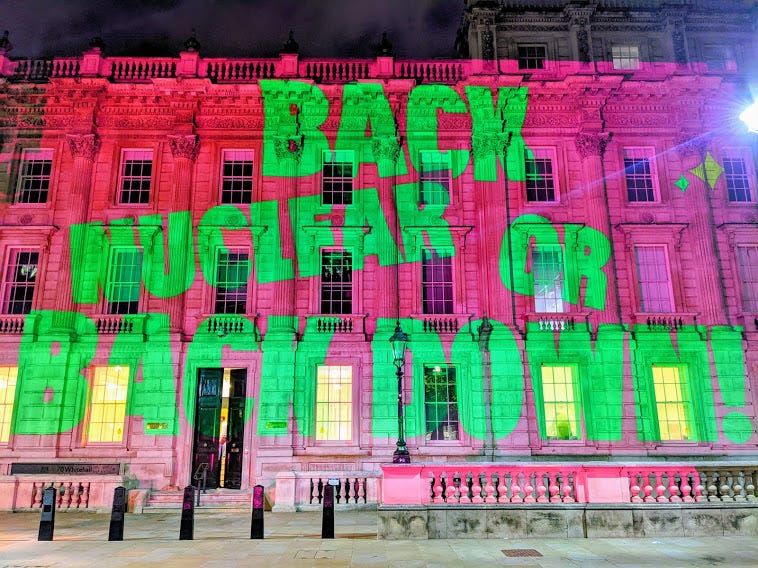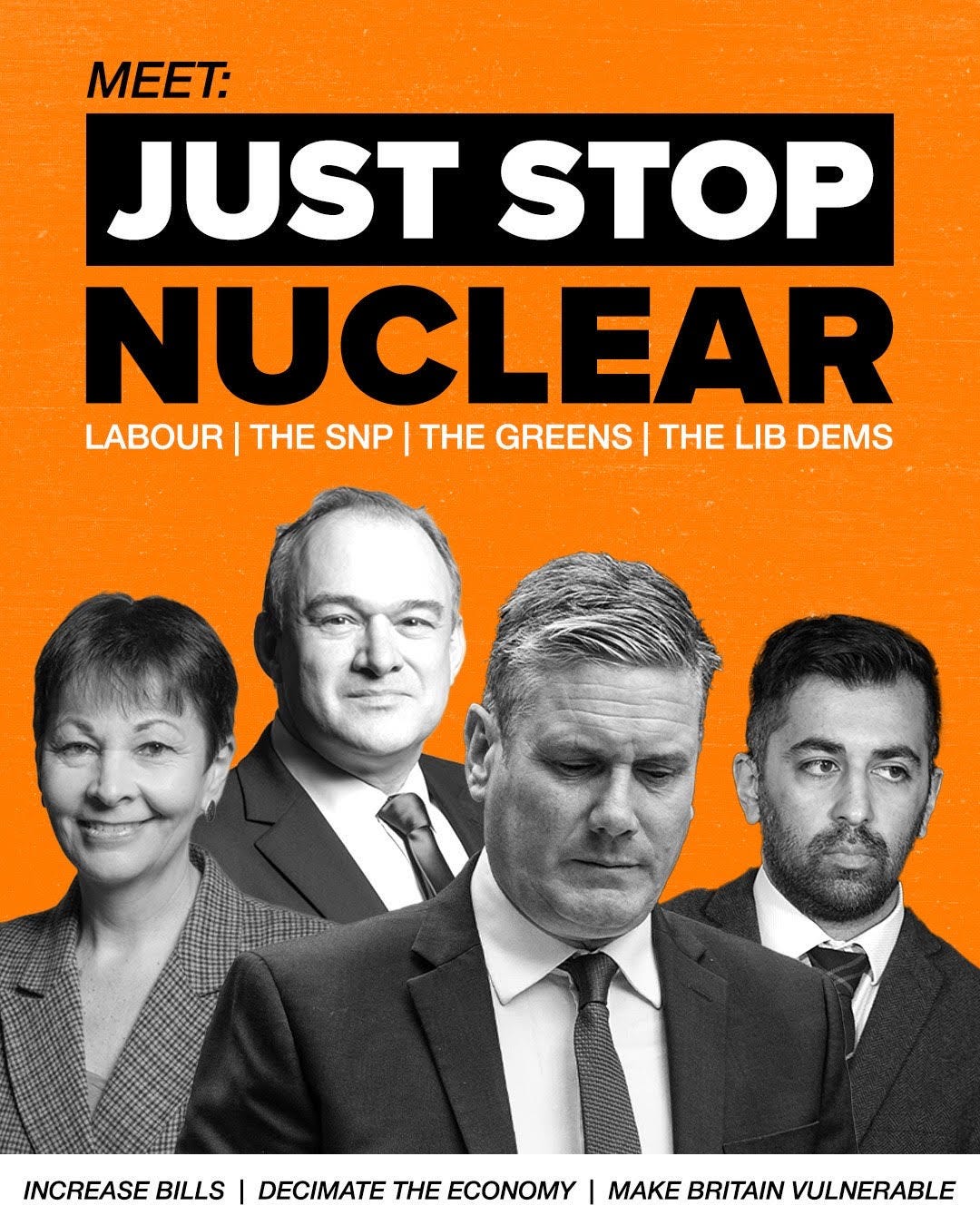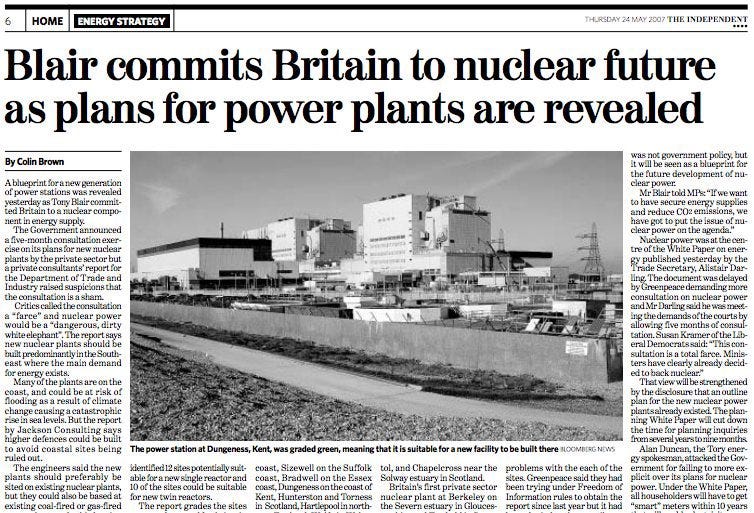Fact check: A brief history of energy politics in the UK
Who is really to blame for stalling the nuclear revival?
The Conservative Secretary of State for the Department of Energy Security and Net Zero, Grant Shapps, has ruffled feathers by attacking opposition politicians who he claims are against nuclear energy, accusing them of putting jobs at risk, increasing bills, and damaging the economy.
Normally I’m not against ruffling a few feathers, but I’m also not a fan of attempts to rewrite history.
Let’s look at his claims. Shapps hits out at other political Parties in the UK: The Labour Party, The Green Party, The Scottish National Party (SNP), and the Liberal Democrats, as being anti-nuclear. The Green Party is indeed opposed to nuclear energy, and campaigns heavily against new nuclear power plants. The SNP has been equally vocal in its opposition to nuclear, favouring only renewables. Last year I clashed with SNP MP David Linden over this on live television, where I corrected his false claim on BBC Politics Live that Scotland runs on 100% renewables.
But what about the main opposition Party: Labour? For some time now, Conservative politicians have blamed Labour for failing to build new nuclear power plants, and Labour has blamed the Conservatives. Who is really to blame?
A brief history of British PMs and their views on nuclear energy
Looking back on the Prime Ministers I have witnessed over my lifetime, I will begin with the leader I remember from my childhood: Labour Prime Minister Tony Blair.
Blair didn’t beat around the bush. When he was Prime Minister, he was openly pro-nuclear, telling MPs: "If we want to have secure energy supplies and reduce C02 emissions, we have got to put the issue of nuclear power on the agenda.” I remember this vividly, because I was against nuclear energy at the time.
Building on this, the Labour government published an Energy White paper outlining a nuclear energy program for Britain. Greenpeace fought the paper on the grounds that it was ‘flawed,’ claiming that it failed to resolve issues such as waste, financial costs and the design of the reactors. The head of Greenpeace's nuclear campaign Sarah North said: "Greenpeace feels compelled to challenge the government on its irrational and unsubstantiated pro-nuclear policy," and they took the government to court.
Greenpeace won the High Court ruling.
Greenpeace 1, Labour 0.
Still, Labour responded to the ruling with a statement that the Party would still plan to build new nuclear. Blair said: "If we don't replace the existing nuclear power stations then, first, I cannot see how we are going to meet our climate change targets. And second… We are going to be dependent on very uncertain supplies of energy and that would be bad for business and for the consumer.”
Ed Miliband, who is now the Labour Shadow Secretary of State for Climate Change and Net Zero, has also consistently spoken in favour of nuclear energy, and in 2009 he backed plans for an ambitious fleet of nuclear reactors in Europe.
However, these plans never came to fruition, as in 2010 Labour lost the general election. The Conservative-Liberal Democrat coalition was now in power.
The Liberal Democrat leader at the time, Nick Clegg, was against nuclear energy. He argued that it was pointless since it wouldn’t come online until 2021 or 2022. This video of Clegg saying this recently went viral, as the irony is not lost on a population that is now dealing with an energy crisis.
Conservative leader David Cameron was also not keen on nuclear energy. Somewhat famously now, Blair called out Tory politicians’ varying views of nuclear energy in Westminster, asking Cameron directly whether he was for or against it: “I’m in favour of it. What’s his position?”
Cameron appeared to favour nuclear energy briefly, speaking in favour of it in 2013, but in another video from around the same time, he also publicly stated that: “the problems of nuclear waste haven’t yet been dealt with” (the video of him saying this was posted online by Greenpeace).
So, we now had a coalition government where both leaders were against nuclear energy. Labour had an ambitious plan, and had started to lay the groundwork for that plan, but it had been slowed by opposition from campaigners. The plan then went out the window with the new coalition.
At around the same time, a public opinion shift against nuclear energy took place, following the meltdown of the Fukushima Daiichi power plant in Japan in 2011. Although the consequences of the meltdown were overblown (it did not claim lives, but the tsunami and earthquake that caused it did), politicians became even more hesitant about backing nuclear energy.
Anti-nuclear campaign groups Greenpeace, Friends of the Earth, World Wide Fund for Nature (WWF), and the Campaign for Nuclear Disarmament (CND) capitalised on public fears of meltdowns and helped to lead a global charge against new nuclear power plants. Many existing nuclear plants were unceremoniously closed. According to the International Atomic Energy Agency (IAEA), “Between 2011-2020, 48 GWe of nuclear capacity was lost globally as 65 reactors were either shut down or did not have their operational lifetimes extended.”
Nuclear energy 0, climate change 1.
I was active in Greenpeace at the time and was told by fellow activists that thousands of deaths had been covered up by the industry in Japan. This was a lie. The real consequence of the meltdown was increased emissions and the accompanying air pollution, which led to actual loss of life. Learning this led me to change my mind and stop campaigning against nuclear energy.
Just stop lying
Back to politics. After Cameron stepped down, Theresa May became PM. She took to the stand in the house of Parliament to blame Labour for inaction on nuclear energy, asking Labour leader Keir Starmer, “Why did [Labour] not build any new nuclear capacity?”
Starmer replied: “Nuclear is vital to our future, and a new generation of power plants should have been built by now… The last Labour government gave the go-ahead for new nuclear sites in 2009. In the 13 long years since then, not one has been completed.”
This statement is true. Conservatives 0, Labour 1.
Starmer has consistently supported nuclear energy, going so far as to call out the SNP for their opposition to nuclear power plants in Scotland. Labour’s current plan, Great British Energy, includes nuclear energy as part of the clean energy transition.
After May stepped down, Boris Johnson became PM. In 2019, Johnson spoke strongly in favour of nuclear energy. Finally, the two major Parties agreed. Johnson was the first Conservative PM in my lifetime to propose building new nuclear power plants. But these projects take time to plan, they face opposition from campaign groups, and they have to be seen through.
In 2022, Liz Truss briefly became Prime Minister. When Johnson resigned, he warned Truss against ditching his plans for nuclear energy. He also argued that the plans should go “further and faster” on renewables like wind, solar and hydrogen, to ensure that as much as 95 per cent of electricity would come from low-carbon sources by 2030.
Truss launched ‘Great British Nuclear,’ aiming to deliver a quarter of Britain’s electricity needs with nuclear energy by 2050.
After Truss came PM Rishi Sunak. Sunak has not been overly vocal about nuclear energy, but appears to support the plan for Small Modular Reactors, continuing the idea of Great British Nuclear.
A massive disappointment
In Shapps’s tweet thread, he claims that Great British Nuclear shows a ‘massive revival’ of nuclear energy in the UK, but this is not true. The government’s proposals for clean energy are depressingly weak. In contrast, the UAE just built four nuclear reactors in under ten years, meeting 25% of the country’s energy needs - and they started from scratch, with no existing industry or expertise. It’s embarrassing to think that the constantly-stalled Great British Nuclear plan constitutes a ‘massive revival’ of nuclear energy in the UK. Even if it is carried out, it will barely meet a quarter of our electricity needs in three decades.
In 2009, the Labour government listed the sites they had designated as suitable for new nuclear plants. These were: Sizewell in Suffolk; Hartlepool in Cleveland; Heysham in Lancashire; Sellafield in Cumbria; Braystones in Cumbria; Kirksanton in Cumbria; Wylfa in Anglesey; Oldbury in Gloucestershire; Hinkley Point in Somerset, and Bradwell in Essex.
Building new reactors at all of these sites would provide countless new jobs, boost the economy, create energy security, help to meet our net zero targets quickly (if done efficiently), and could be called an ambitious plan.
In summary
Due to years of political inaction, effective protests, over-regulation, and a lack of skilled workers, nuclear builds in the UK are slow and unambitious.
Campaign groups continue to oppose nuclear energy in Britain, as do many opposition politicians. Shapps hits out at them in his tweets, but this is an own goal: as demonstrated by this article, anti-nuclear campaigners have influenced the views of Tory politicians on nuclear energy for many years (e.g. Cameron’s aforementioned fears of nuclear waste, which is not actually a problem).
Who’s to blame? Activist groups, short-term thinking, and weak leadership. Anyone who has had the power to build a strong clean energy program, and has failed to do so.
Labour has consistently fought for clean energy for decades. Some of the Lib Dems and Tories who were against it have now come around to it. But ultimately, this is not a politically left vs right issue. It is an us vs climate change issue. It is us vs the future of our planet. The current lack of clean energy, and weak energy security, impacts us all. The question now is, can we learn from past mistakes and do better?
Thanks to evidence-based activists fighting back, public support for nuclear energy has steadily increased in Britain, as the general understanding of and need for this clean and reliable energy source has also increased. The global energy crisis has propelled the discussion forward even further, and led to even more support.

What would a real nuclear revival look like?
At present, no political Party has detailed an ambitious and realistic plan to decarbonise Britain that is based on data.
A real plan would mean focusing on the goal: setting an ambitious target, and ensuring that that target is met.
It would mean mobilising as if we are on a war footing. Given the reality of climate change, deadly air pollution, and the ongoing energy crisis, we should be on a war footing already. If we were, we would be pulling out all the stops: recruiting workers en masse; handing out engineering apprenticeships and training builders, welders, etc. It would mean employing a standardisation approach, which means using the same engineers to build the same reactors one after another, which would also assure workers of jobs at future new nuclear plants.
A real plan would involve a mass public communication initiative to address fears of nuclear energy and combat NIMBYism (again, the UAE has excelled at this). It would look at Planning reform to speed up new builds (read this article to learn about how campaigners have slowed down progress at Sizewell C), reviewing the current over-regulation of nuclear power plants, and establishing financial backstops where needed.
If this was genuinely ‘Great British Nuclear,’ all of Britain would be included. There are only three new builds currently proposed by the government’s plan, and these will be rolled out at a slow pace. Although work needs to be done to convince Scotland to join the team, the Welsh Government has been asking for new nuclear investment for some time, but Wales has been left out. The existing sites of Wylfa and Trawsfynydd in Wales are ideal for new nuclear builds, and they have the social license needed to build them. This is a missed opportunity.
Britain 0, climate change 1.
For their ambitions to be considered ‘massive’ or ‘great,’ the UK Government should be aiming for at least 70% nuclear energy in the mix, which our neighbours across the pond - France - achieved in only a decade in the 1970s. France has provided the world with a workable case study for decarbonisation. Why can’t Britain replicate it?
Sniping at other Parties with false claims is not going to get the job done. We need less complaining, and more competence. We need to learn from history, not try to rewrite it.
At the risk of sounding naïve in a world of politics, we also need more teamwork and team building, and less finger-pointing. After all, there is only one team when it comes to energy security, clean air and fighting global heating: team Earth. And there is only one real message and goal for Britain:
Build, build, build.







We are paying the price now for the bad decisions (and lack of decisions) of the 1990s and 2000s. The conservatives at that time were more interested in electricity market liberalization than in implementing any sort of joined up energy policy. Eventually it became clear to even the dimmest politician that a market system driven by an artificially created spot price, that changes every half an hour, is no basis for funding capital projects that could take 20 years to build and will then operate for a further 60 years.
So much wasted time. Let’s not do the same, so much could be done in 10 years just look at UAE like you say.